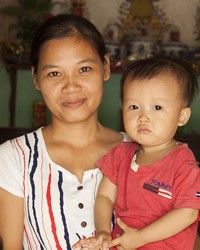Tsun-Lao in Vietnam

Photo Source:
Duc Tue Dang - Pixabay
|
Send Joshua Project a map of this people group.
|
| People Name: | Tsun-Lao |
| Country: | Vietnam |
| 10/40 Window: | Yes |
| Population: | 14,000 |
| World Population: | 14,000 |
| Primary Language: | Ts'un-Lao |
| Primary Religion: | Ethnic Religions |
| Christian Adherents: | 1.00 % |
| Evangelicals: | 0.08 % |
| Scripture: | Translation Started |
| Ministry Resources: | No |
| Jesus Film: | No |
| Audio Recordings: | No |
| People Cluster: | Thai |
| Affinity Bloc: | Southeast Asian Peoples |
| Progress Level: |
|
Introduction / History
The Tsun-Lao live in the mountainous regions of northern Vietnam, where Vietnamese influence was minimal until the 1900s. Today, however, many are assimilated into the Vietnamese culture. The Tsun-Lao are part of a larger cultural linguistic group of Tai peoples, which includes the Shan, the Laotians and others. It is possible that the Tsun-Lao and the Lao are the same official ethnic community.
Centuries ago, the Tsun-Lao lived in China. However, relentless pressure by the Chinese gradually forced them southward into Laos, Myanmar, Thailand, and Vietnam. In 1954, Communist rebels emerged in North Vietnam, and military regimes formed, leading to massive bloodshed. The war finally ended in a Communist victory in 1975, when the Communist Republic of North Vietnam overtook South Vietnam.
What Are Their Lives Like?
The Tsun-Lao are primarily rice farmers, but gathering forest products, fishing, hunting, livestock production, and making handicrafts are also important. The farmers grow wet rice on terraces watered by small brooks. They also raise dry rice on swiddens, or plots cleared by the slash-and-burn method. Since rice production is minimal, they gather cinnamon and wood to sell or trade.
The Tsun-Lao live in villages alongside rivers or near roads that give them access to Chinese merchants. Their houses are typically made of wood or bamboo. They are built high on stilts. Poultry, pigs and goats may run freely underneath the houses. The Buddhist Wat, or temple, is the center of village life.
The Tsun-Lao live in villages alongside rivers or near roads that give them access to Chinese merchants. Their houses are typically made of wood or bamboo. They are built high on stilts. Poultry, pigs and goats may run freely underneath the houses. The Buddhist Wat, or temple, is the center of village life.
In times past, social organization among the Tsun-Lao was aristocratic. A headman with much authority led each village. In 1945, that authority was abolished. Now a committee elected by the people's council governs the villages. There is no longer a rigid social class system or a hereditary elite class. Modern Tsun-Lao social structure is based on family units, with no widespread lineages or clans.
Tsun-Lao culture has changed dramatically because of Vietnam's transition from a feudal to a communist society. The farmers now belong to agricultural cooperatives. In addition, small-scale industrialization has helped provide new kinds of jobs. In general, the Vietnamese government has improved education and health care. There is now a medical school and some hospitals in the Tsun-Lao region. These have helped gain control over diseases such as smallpox, cholera, tuberculosis, and malaria.
What Are Their Beliefs?
Most Tsongas are Christian, and they associate their creator god, Leza, with the God of the Bible. Leza was unapproachable, but they knew they could pray to their Heavenly Father.PRGRPHMizimos are the spirits of dead ancestors. Everyone becomes a mizimo after they die. They hold ceremonies to honor those who recently died. Tsonga men and women make offerings to ancestral spirits on behalf of their families.PRGRPHThey also believe in invading spirits and ghosts, both of which they associate with demons. Spirit mediums discover the will of the spirits. They believe Christian religious leaders can control the power of sorcerers. Rainmakers also have power, and they seek their help in times of drought. Rainmaking ceremonies involve singing and dancing rituals.
What Are Their Needs?
Unless they have medical clinics, the Tsongas rely on traditional medicine. There are not enough medical clinics for their needs.
Prayer Points
Pray for a movement of the Holy Spirit among Tsun-Lao people in Vietnam that will result in church plants and discipleship.
Pray for Tsun-Lao in Vietnam to have receptive hearts, and that they would encounter the King of kings.
Pray that movements to Christ would explode, as followers make followers, and that they would place their identity in Christ.
Ask God to raise up prayer teams who will begin breaking up the spiritual soil through worship and intercession.
Ask the Lord to bring forth a vigorous Tsun-Lao church for the glory of his name!